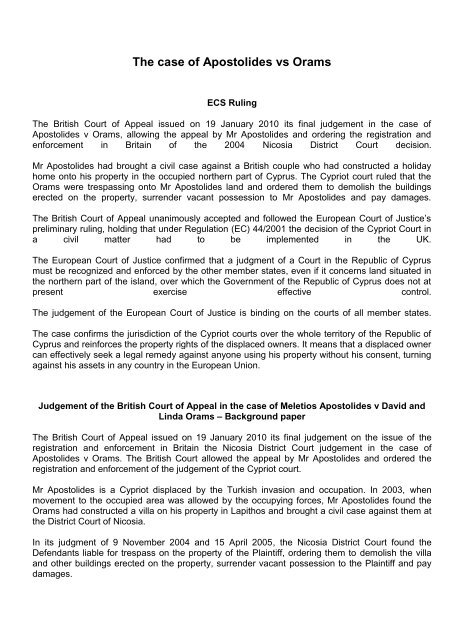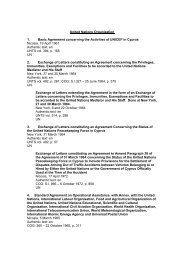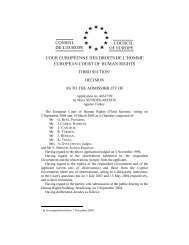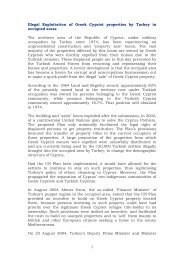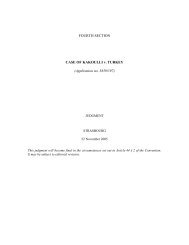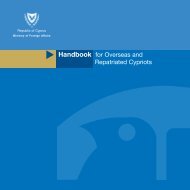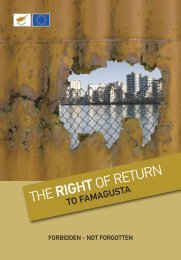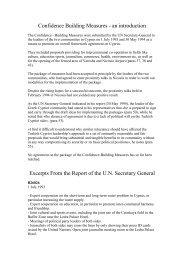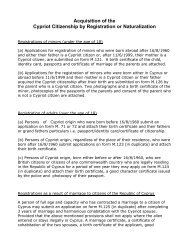The case of Apostolides vs Orams.pdf
The case of Apostolides vs Orams.pdf
The case of Apostolides vs Orams.pdf
Create successful ePaper yourself
Turn your PDF publications into a flip-book with our unique Google optimized e-Paper software.
<strong>The</strong> <strong>case</strong> <strong>of</strong> <strong>Apostolides</strong> <strong>vs</strong> <strong>Orams</strong>ECS Ruling<strong>The</strong> British Court <strong>of</strong> Appeal issued on 19 January 2010 its final judgement in the <strong>case</strong> <strong>of</strong><strong>Apostolides</strong> v <strong>Orams</strong>, allowing the appeal by Mr <strong>Apostolides</strong> and ordering the registration andenforcement in Britain <strong>of</strong> the 2004 Nicosia District Court decision.Mr <strong>Apostolides</strong> had brought a civil <strong>case</strong> against a British couple who had constructed a holidayhome onto his property in the occupied northern part <strong>of</strong> Cyprus. <strong>The</strong> Cypriot court ruled that the<strong>Orams</strong> were trespassing onto Mr <strong>Apostolides</strong> land and ordered them to demolish the buildingserected on the property, surrender vacant possession to Mr <strong>Apostolides</strong> and pay damages.<strong>The</strong> British Court <strong>of</strong> Appeal unanimously accepted and followed the European Court <strong>of</strong> Justice’spreliminary ruling, holding that under Regulation (EC) 44/2001 the decision <strong>of</strong> the Cypriot Court ina civil matter had to be implemented in the UK.<strong>The</strong> European Court <strong>of</strong> Justice confirmed that a judgment <strong>of</strong> a Court in the Republic <strong>of</strong> Cyprusmust be recognized and enforced by the other member states, even if it concerns land situated inthe northern part <strong>of</strong> the island, over which the Government <strong>of</strong> the Republic <strong>of</strong> Cyprus does not atpresent exercise effective control.<strong>The</strong> judgement <strong>of</strong> the European Court <strong>of</strong> Justice is binding on the courts <strong>of</strong> all member states.<strong>The</strong> <strong>case</strong> confirms the jurisdiction <strong>of</strong> the Cypriot courts over the whole territory <strong>of</strong> the Republic <strong>of</strong>Cyprus and reinforces the property rights <strong>of</strong> the displaced owners. It means that a displaced ownercan effectively seek a legal remedy against anyone using his property without his consent, turningagainst his assets in any country in the European Union.Judgement <strong>of</strong> the British Court <strong>of</strong> Appeal in the <strong>case</strong> <strong>of</strong> Meletios <strong>Apostolides</strong> v David andLinda <strong>Orams</strong> – Background paper<strong>The</strong> British Court <strong>of</strong> Appeal issued on 19 January 2010 its final judgement on the issue <strong>of</strong> theregistration and enforcement in Britain the Nicosia District Court judgement in the <strong>case</strong> <strong>of</strong><strong>Apostolides</strong> v <strong>Orams</strong>. <strong>The</strong> British Court allowed the appeal by Mr <strong>Apostolides</strong> and ordered theregistration and enforcement <strong>of</strong> the judgement <strong>of</strong> the Cypriot court.Mr <strong>Apostolides</strong> is a Cypriot displaced by the Turkish invasion and occupation. In 2003, whenmovement to the occupied area was allowed by the occupying forces, Mr <strong>Apostolides</strong> found the<strong>Orams</strong> had constructed a villa on his property in Lapithos and brought a civil <strong>case</strong> against them atthe District Court <strong>of</strong> Nicosia.In its judgment <strong>of</strong> 9 November 2004 and 15 April 2005, the Nicosia District Court found theDefendants liable for trespass on the property <strong>of</strong> the Plaintiff, ordering them to demolish the villaand other buildings erected on the property, surrender vacant possession to the Plaintiff and paydamages.
Pursuant to EC Regulation 44/2001, the judgments <strong>of</strong> the civil courts <strong>of</strong> the Republic <strong>of</strong> Cyprus canbe enforced in any <strong>of</strong> the Member States <strong>of</strong> the European Union against the assets <strong>of</strong> theDefendants in that state. Mr <strong>Apostolides</strong> sought to have this judgement enforced in Britain.On 6 September 2006 a Judge <strong>of</strong> the Queen's Bench Division <strong>of</strong> the High Court <strong>of</strong> Justice in theUK allowed the <strong>Orams</strong>' appeal against registration and enforcement in Britain <strong>of</strong> the Cypriotjudgment on the grounds that the application <strong>of</strong> the acquis communautaire was suspended in theoccupied area. That court had nevertheless pointed out that, according to the relevant judgments<strong>of</strong> the European Court <strong>of</strong> Human Rights, the property rights <strong>of</strong> Mr. <strong>Apostolides</strong> in relation to theproperty in question remain in force and Mr. <strong>Apostolides</strong> remains the lawful owner <strong>of</strong> his propertyin Lapithos. It was also his opinion that the British couple were indeed trespassers.Mr <strong>Apostolides</strong> appealed the High Court's decision to the Court <strong>of</strong> Appeal <strong>of</strong> England and Wales,which in turn requested a preliminary ruling from the European Court <strong>of</strong> Justice, in relation to therecognition and enforcement <strong>of</strong> a judgment <strong>of</strong> the District Court <strong>of</strong> Nicosia concerning land in thearea not under the effective control <strong>of</strong> the Government <strong>of</strong> the Republic <strong>of</strong> Cyprus, where, accordingto Protocol 10 to the Treaty <strong>of</strong> Accession <strong>of</strong> Cyprus to the EU, the application <strong>of</strong> the acquiscommunautaire is suspended.<strong>The</strong> European Court <strong>of</strong> Justice confirmed that a judgment <strong>of</strong> a Court in the Republic <strong>of</strong> Cyprusmust be recognized and enforced by the other member states, even if it concerns land situated inthe northern part <strong>of</strong> the island. On 28 April 2009 the Court ruled:1. That the suspension <strong>of</strong> the application <strong>of</strong> the acquis communautaire in those areas <strong>of</strong> theRepublic <strong>of</strong> Cyprus in which the Government <strong>of</strong> Cyprus does not exercise effective control, doesnot preclude the application <strong>of</strong> Council Regulation (EC) No 44/2001 on jurisdiction and therecognition and enforcement <strong>of</strong> judgements in civil and commercial matters, to a judgement whichis given by a Cypriot court sitting in the area <strong>of</strong> the island effectively controlled by the CyprusGovernment, but concerns land situated in the areas not so controlled.2. <strong>The</strong> fact that the judgement cannot, as a practical matter, be enforced where the land is situateddoes not constitute a ground for refusal <strong>of</strong> recognition or enforcement under Art. 34(1) <strong>of</strong> Reg.44/2001 and it does not mean that such a judgement is unenforceable for the purposes <strong>of</strong> Art.38(1) <strong>of</strong> that Regulation.<strong>The</strong> Court <strong>of</strong> Appeal unanimously accepted and followed the ECJ’s preliminary ruling, holding thatthe <strong>Orams</strong> had to implement the decision <strong>of</strong> the Cypriot court. It also held that, according to theRegulation 44/2001, its decision was final. <strong>The</strong> <strong>Orams</strong> are now called to pay a significant amountin pecuniary damages and legal costs, as well as cease their trespassing onto Mr <strong>Apostolides</strong>land.This <strong>case</strong> is very important as, it confirms that the exploitation <strong>of</strong> the properties <strong>of</strong> displaced GreekCypriot owners in the occupied areas is illegal, that the displaced owners have not lost their rightsto their properties and reinforces those rights by allowing an effective legal remedy in civil law inthe European Union. It means that, a <strong>case</strong> could be brought against anyone who trespasses overthe property <strong>of</strong> displaced owners and has property in the European Union. This legal precedentthus provides a great disincentive to further exploitation and marketing <strong>of</strong> those properties, against
the policy <strong>of</strong> the occupation authorities for the alienation <strong>of</strong> those properties from their lawfulowners. <strong>The</strong> judgement <strong>of</strong> the European Court <strong>of</strong> Justice is binding on the courts <strong>of</strong> all memberstates, if they are called upon to enforce judgements concerning properties in the occupied area.It is also noted that, in its judgement the British Court <strong>of</strong> Appeal referred to the obligations imposedon states by the binding nature <strong>of</strong> the Security Council Resolutions, which call, inter alia, forrespect <strong>of</strong> the sovereignty and territorial integrity <strong>of</strong> the Republic <strong>of</strong> Cyprus and the non-recognition<strong>of</strong> the secessionist entity. <strong>The</strong> Court stressed that respect <strong>of</strong> the sovereignty <strong>of</strong> the Republic <strong>of</strong>Cyprus entails the respect and recognition <strong>of</strong> the decisions <strong>of</strong> the Cypriot judiciary.<strong>The</strong> European Court <strong>of</strong> Justice Ruling<strong>The</strong> European Court <strong>of</strong> Justice ruled on Tuesday 28 th April 2009 that a judgment <strong>of</strong> a Court in theRepublic <strong>of</strong> Cyprus must be recognized and enforced by the other EU member states even if itconcerns land situated in the area <strong>of</strong> Cyprus occupied by Turkey.According to a press released by the European Court <strong>of</strong> Justice on the <strong>Apostolides</strong> <strong>vs</strong> <strong>Orams</strong><strong>case</strong>, the suspension <strong>of</strong> the application <strong>of</strong> Community law in the areas where the government <strong>of</strong>the Republic <strong>of</strong> Cyprus does not exercise effective control and the fact that the judgment cannot,as a practical matter, be enforced where the land is situated do not preclude its recognition andenforcement in another member state.<strong>The</strong> Court's ruling refers to the <strong>Apostolides</strong> <strong>vs</strong> <strong>Orams</strong> <strong>case</strong>. Mr <strong>Apostolides</strong> had brought a <strong>case</strong> atthe Cypriot District Court against a British couple who had constructed a villa on his property. In itsjudgment <strong>of</strong> 15 November, the Nicosia District Court found the Defendants liable for trespass inthe property <strong>of</strong> the Plaintiff, ordering them to demolish the villa and other buildings erected on theproperty, surrender vacant possession to the Plaintiff and pay damages. Pursuant to ECRegulation 44/2001, the judgments <strong>of</strong> the civil courts <strong>of</strong> the Republic <strong>of</strong> Cyprus can be enforced inany <strong>of</strong> the Member States <strong>of</strong> the European Union against the assets <strong>of</strong> the Defendants in thatstate. Mr <strong>Apostolides</strong> sought to have this judgement enforced in Britain.On 6 September 2006 a Judge <strong>of</strong> the Queen's Bench Division <strong>of</strong> the High Court <strong>of</strong> Justice in theUK issued his judgment on the <strong>Orams</strong>' appeal against registration and enforcement in Britain <strong>of</strong>the Cyprus judgment in favour <strong>of</strong> Mr. <strong>Apostolides</strong>. Although on technical points the British Courtavoided getting involved in enforcing the Cyprus judgment and allowed <strong>Orams</strong>'s appeal, it needsto be stressed that on the substance <strong>of</strong> the <strong>case</strong> the British Court pointed out that, according to therelevant judgments <strong>of</strong> the European Court <strong>of</strong> Human Rights, the property rights <strong>of</strong> Mr. <strong>Apostolides</strong>in relation to the property in question remain in force and Mr. <strong>Apostolides</strong> remains the lawful owner<strong>of</strong> his property in Lapithos.Mr <strong>Apostolides</strong> appealed the High Court's decision at the Court <strong>of</strong> Appeals <strong>of</strong> England and Wales,which has requested a preliminary ruling from the European Court <strong>of</strong> Justice, in relation to therecognition and enforcement <strong>of</strong> a judgment <strong>of</strong> the District Court <strong>of</strong> Nicosia.<strong>The</strong> European Court <strong>of</strong> Justice confirmed that a judgment <strong>of</strong> a Court in the Republic <strong>of</strong> Cyprusmust be recognized and enforced by the other member states even if it concerns land situated inthe northern part <strong>of</strong> the island.


